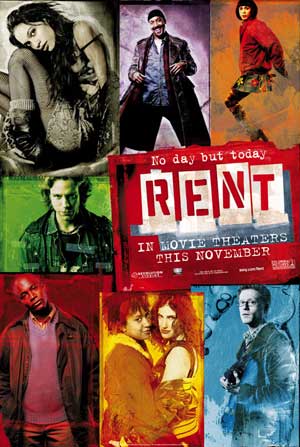 This Thanksgiving, the big family movie is a musical about AIDS, homosexuals, cross dressers and heroin addicts. The Broadway smash Rent is finally getting to theaters after a decade in development, including a time when Spike Lee was going to direct.
This Thanksgiving, the big family movie is a musical about AIDS, homosexuals, cross dressers and heroin addicts. The Broadway smash Rent is finally getting to theaters after a decade in development, including a time when Spike Lee was going to direct.
Chris Columbus is who ended up in the director’s chair, though – the same guy who did the first two Harry Potter films and Mrs. Doubtfire. It’s a serious change up for the director, so at the New York City press day for the film, it was the first question Columbus faced.
Q: How do you go from Harry Potter to AIDS and heroin addiction?
Columbus: You know, it’s a big world out there. Honestly, as a director, if I start doing the same thing over and over again, I’m going to get bored really quickly. I need a reason to get out of bed in the morning and go to work. I’ve been waiting nine years to do this movie, so I was obsessed, and for various reasons, I couldn’t do it. Other directors were attached to it, so for me, it was really important to do this film. I was a like a racehorse at the starting gate, when I was finally told I could get this movie done.
Q: Was there any resistance from Jonathan Larson’s family to you directing??
Columbus: I never sense that resistance from the Larsons. Certainly, some people in the press were like “The guy who did Harry Potter and Home Alone is going to do this.” For some reason, because I’ve done films that dealt with the issue of family, they’ve kind of been linked, whether they were good films or bad films. Home Alone deals with a kid who doesn’t have a family. Harry Potter is a kid who’s searching for his family, and this is about a different type of family. So I’m always fascinated by those particular themes, but that’s a really extreme connection in a sense. I just felt that I was the right guy to do this movie, and in an odd way, this movie’s more personal for me because I lived in Manhattan for 17 years. I lived in a loft. I knew all these people when I was struggling at NYU; I knew musicans and actors and artists and that was the world I knew.
Q: How did you decide you wanted to make this – had you seen it on Broadway?
Columbus: I saw it in 1996 with the original cast and I’d never really experienced that kind of emotion in a theatre before. It was just really emotionally powerful for me, and I went back about five days later, and saw it again, and I didn’t realize until I was casting the film there were a few ways we could go. We could cast the film with entirely unknowns. We could cast the film…
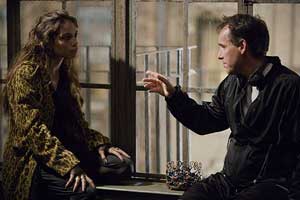 Q: What about Justin Timberlake and Christina Aguilera?
Q: What about Justin Timberlake and Christina Aguilera?
Columbus: That’s what I was going to say. There is the pop star version with Justin Timberlake, Christina Aguilera, Usher. I went so far as meeting Justin. He’s a terrific guy— I don’t know if you guys ever met him—but he’s actually a really kind of a sweet guy. But then I started to meet the original cast, and I realized the thing I responded to was the connection that they had, partially because of Jonathan Larson’s death. Jonathan tragically died the night before the first preview. Well, that connected these people in a very strong way. There’s a deep intense connection when you’re doing that play 16 months. They did it together for 16 months and they formed this really, really strong group and there’s a chemistry there that as a director, I had never seen before.
Q: Stage actors don’t make necessarily make good film actors. How did you know that the original stage cast was going to work on film?
Columbus: I just met with them all. I met with them all, talked to them all, carefully considered whether or not they could still do it, and I realized there was that connection. I mean, these people originated these roles, so if you go see Rent now then you still see people – and this is not to take anything away from the actors doing Rent – but the guy who plays Mark is doing a bit of Anthony Rapp impersonation. These roles are different from the roles in something like Les Mis or West Side Story, because these people actually real in a sense, it’s another side of them. The Jesse Martin you see in Rent is really close to the Jesse Martin I know, as opposed to the Jesse Martin from Law & Order, so I think these people are closer to these roles and that’s the way they were cast.
Q: How often did you have to tone them down because they’re not playing to the balcony here and you have cameras close up?
Columbus: There was a few times. Idina was the most concerned. She asked me ‘Make sure my mouth doesn’t look too big when I’m singing.’ So I was aware of that. The key was I spoke to the original choreographer Marlies Yearby, and she said that the choreography really shouldn’t look like choreography. In other words, it came from within these actors. It came from within their characters, and the only really traditionally choreographed number in the film is the fantasy sequence from “Tango Maureen.” Everything else should feel more naturalistic, but again, that took months and months of rehearsal.
Q: So you were living around New York’s Alphabet City during the era in which the show is set. Can you talk about recreating that?
Columbus: Oh, yeah. Unfortunately, New York City’s become a little like Disneyland now. When you’re here for 17 years – it really was the line in the film “I’m a New Yorker. Fear is my life.” That was our motto every day, but now, it’s gentrified. I mean, to recreate Alphabet City in the late ‘80s was akin almost to doing a Western or something, because you go down there and there’s a Starbuck’s on every corner, wireless internet cafes, DVD stores. Things that just couldn’t exist. So we had to really carefully pick and choose our locations. And I wanted to shoot the entire picture here, but there’s also an ordinance in Manhattan that says you cannot do music playback after 10pm, because of all of the rock and roll videos that have been shot, and we got an extension til midnight on a Friday night to do one song “Glory” on a rooftop. Other than that, I was completely confused, because I had no place to shoot the “Rent” number and we were forced to build that street on an LA. We found some alleyways in Oakland. Recreating New York City in the ‘80s was extremely difficult.
Q: Was the success of Chicago part of what set the ball rolling on this film?
Columbus: I think I owe a great debt to Chicago and probably Moulin Rouge because people are now interested in making musicals again. And it’s a valid genre. The most difficult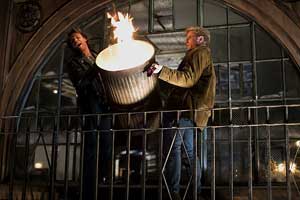 aspect was originally some creative people around were saying ‘Well, what device are you going to use in Rent to get these people sing because in Chicago, we went into her head to trigger the musical numbers.’ They said ‘You can’t just have people singing on screen,’ and I was like ‘But people have been singing on screen since 1929 and the Jazz Singer.’ It’s a genre, it’s an ar tform. They said ‘Audiences won’t accept it these days.’ I was convinced that we can do it, if we created a realistic world, a world that felt like it was real, the songs would be acceptable, and that was the reason we really started the picture with “Seasons of Love.” It was our way of saying ‘This is a musical. Everyone can sit back, relax. People are going to be singing for the next two hours.’
aspect was originally some creative people around were saying ‘Well, what device are you going to use in Rent to get these people sing because in Chicago, we went into her head to trigger the musical numbers.’ They said ‘You can’t just have people singing on screen,’ and I was like ‘But people have been singing on screen since 1929 and the Jazz Singer.’ It’s a genre, it’s an ar tform. They said ‘Audiences won’t accept it these days.’ I was convinced that we can do it, if we created a realistic world, a world that felt like it was real, the songs would be acceptable, and that was the reason we really started the picture with “Seasons of Love.” It was our way of saying ‘This is a musical. Everyone can sit back, relax. People are going to be singing for the next two hours.’
Q: Why is the time right for this movie now? Why do the themes resonate now and are they as pronounced now as they were when the play first ran?
Columbus: Oh, without a doubt. There were some studios that didn’t want to make the movie. Thankfully, Joe Roth and Revolution loved the play, loved the music, loved the script and agreed to make the film, but the people who didn’t want to make the film said ‘Oh, it’s dated. AIDS is no longer an issue.’ And I was horrified, and I said to them ‘AIDS is a global epidemic. AIDS is much worse of a situation than it’s ever been.’ We, as a country, have taken a huge step backwards since 1989 when this play was written and we need to see a film about acceptance and tolerance and particularly diversity. We’re ignoring that and we’ve become a little too isolated for our own good, so that’s why I think the time is right.
Q: Can you talk about getting Green Day producer Rob Cavallo to produce the music?
Columbus: Well, as much as I love the music from the show – the Broadway Cast Album was kind of the soundtrack to my life for nine years, so I was listening to it constantly. I was a huge fan of it – but I always thought, and the actors would always tell me this, the Broadway Cast Album was recorded in three days and they were doing the show at the same time, so they all had a lot of technical problems with it. I also felt that it leans slightly a little too far to the Broadway side of it, and I thought that it could be closer to a really strong rock ‘n’ roll record. I picked up the Green Day record the day it came out, because I’m an obsessive music fan, so I heard that record and I thought this is one of the best sounding rock records I’ve heard in the last 10 years. I saw Rob’s name and I arranged a meeting, and I asked if he’d be interested in doing the film, and he decided to do it. It really stemmed from two numbers. I was not happy with the quality of the Broadway Cast Album of “Rent” and “Out Tonight”, two really strong rock ‘n’ roll songs that I felt could have much stronger power and that’s what Rob brought to it.
Q: What about the various cuts from the show…what about April’s suicide? Isn’t that like a major part of the story?
Columbus: April’s suicide was shot. It just didn’t fit into the montage sequence. Well, actually I talked about it with the writer a lot and I wanted to be a little more ambiguous about how April died.
Q: What about Halloween and Contact?
Columbus: Yeah, those were late cuts and Contact was an early cut, that’s why it didn’t make the CD. Contact was a number that we had choreographed it and rehearsed it for about three or four months but wasn’t recorded because of pacing. I felt that it would slow the film down, so we didn’t shoot that, but Goodbye Love – actually, when I watched the first cut of the film I would get to the point after Angel’s funeral, after the cemetery sequence where Goodbye Love happens and I would find myself emotionally shutting down. I didn’t want any more emotion. As an audience member, I couldn’t handle it, and it really, really hurt the end of the film. In a theatre, remember, you have some distance from the actors, so a theatre, 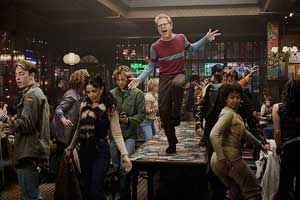 you accept Goodbye Love. On film, it just was too much, so I had to cut it. The minute I cut it, the film worked. It felt like you could accept the end of the film now. But I won’t put it back into the bulk of the film [for the DVD] because I do really feel that it hurts the pacing. It will be a deleted scene [on the DVD]. Because of the language of cinema, the use of close-ups, the fact that you’re in these characters’ heads and you’re much closer to them, I just felt that the emotional level was too much. You’ll see it when you see it.
you accept Goodbye Love. On film, it just was too much, so I had to cut it. The minute I cut it, the film worked. It felt like you could accept the end of the film now. But I won’t put it back into the bulk of the film [for the DVD] because I do really feel that it hurts the pacing. It will be a deleted scene [on the DVD]. Because of the language of cinema, the use of close-ups, the fact that you’re in these characters’ heads and you’re much closer to them, I just felt that the emotional level was too much. You’ll see it when you see it.
Q: How much do you worry about the Rentheads who disagree with your opinion on that that the play is the Holy Grail?
Columbus: That’s fine. They can feel that way. I can only say that I’ve seen it and maybe we’ll give them an alternate, but I really do feel that it’s almost tilts it – again, you learn over the years that there’s a very fine line between what works and what doesn’t work, and it felt slightly melodramatic to me to have that argument in the film.
Q: And you’re used to working with hardcore fans anyway…
Columbus: I was going to say… I mean, that was like an exorcism for me, because I would get… after doing those… by the time we got t the third movie, we realized let’s concentrate on making the film and let’s just forget about people talking and listening to the fans so much ‘cause being that faithful has its drawbacks. I would get letters -1,000 letters from kids telling me to make the movies longer and 1,000 letters from parents telling me to make the movies shorter, so I just realized, stop listening to people and work on the film. When we got to the third film, we realized [that we should] just think about the film and I think that philosophy continued in Goblet of Fire, but it certainly inspired me. So I thought to myself, I gotta think about the film first and believe me, when I tell you, the film didn’t work with Goodbye Love, it just didn’t. It’s a much better film because of that…
Q: This is getting a wide release, rather than a platform but there’s a question about it being too gay for mainstream America.
Columbus: As I said earlier, I think people need to see this movie. People have to be a lot more accepting and a lot more tolerant. Maybe it’s just incredibly naïve but – the picture was given an R-rating originally, and the MPAA gave me a list of things to cut. They gave me 5 to 7 language issues and they gave me a list of 30 picture edits they wanted me to change. I talked to the studio, and they said ‘No, you don’t have to cut anything. PG-13 would be amazing for us, because everyone would see the film. Just do what you feel you need to do.’ So I made five language cuts and I didn’t touch the film, the picture, at all, and they came back and gave us a PG-13. And they said that they felt the film was strong enough that ages 13 to 17 needed to see this film. I was actually impressed that a conservative group like the MPAA gave us a PG-13. Now that may have its drawbacks, you know. If you’re going to be taking grandma and little Joey to see Rent on Thanksgiving, they might not know what to expect, but it’s okay to shake people up a little bit, I think. I think it’s important that people wake up and see this. They have the opportunity to walk out and get their money back if they have a problem with it.
Q: Do you think this film will change the way the critics perceive you?
Columbus: I don’t know. I really have no idea. I just know that I have to try to become a better director as I get older and as you get older, you become a little more mature. Maybe I’ve been maturing at a later rate mentally, I don’t know. I just believe that I have to make movies that I’m excited about and obviously, when you wait nine years to do something and you’re passionate about the themes, you change as a person. You know, I am really passionate about the themes of this film. I think it’s important for people to see this film. I don’t know if I could ever go back and do some of the pictures I did in the past at this point in my life.
Q: You have a lot of projects in various stages. Can you talk about some of them such as Sub-Mariner? Which one are you doing next?
Columbus: I’m not doing Sub-Mariner. I have no idea. I really..I’m not lying when people ask me what are you doing next? I just don’t know. I am so… if I have to take this film under my arm and tell people about it, I’ll do it. I really can’t think about anything else.
Q: Would you go back to Harry Potter again?
Columbus: I love the 5th book. I love that book, but I don’t think I can get back. I can’t move my entire circus of a family back to England. It would be too difficult.
Q: Because of the collaboration of all these actors who were in the original play, did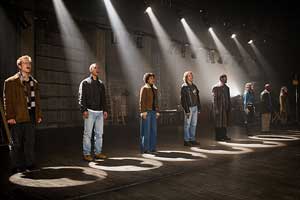 you use them more…did they get more input than the average actor would?
you use them more…did they get more input than the average actor would?
Columbus: Well, not more. I tend to be collaborative. If I think that the actor’s intelligent then I value their opinion and I happen to be blessed with 8 really smart actors who originated these roles so yeah, it was a very collaborative set. Most of the intense discussions revolved around choreography and how we wanted to make, we wanted it to appear–with the exception of “Tango Maureen”—was that there was a lack of choreography. But in doing that, it’s like when you’re making a rock record that you want to sound live, it takes a lot of rehearsal. You can’t just go into the studio and record it, and have it sound raw and live, you have to actually be even more prepared to make it sound or look improvised.
Q: How did Rosario fit into this?
Columbus: It was amazing, because she came in for the audition. I had no idea that she could sing and dance. She came in and did Without You and Out Tonight and she was – by her accounts, she was nervous, but she was really… there was a fragile quality to her performance and I was blown away. The producer and I, Mark Barnathan, ran after her and said ‘You’ve got the role.’ I mean, that never happens. We just knew it was right.
Q: Do you think the film will give people a deeper understanding of the play?
Columbus: Yeah, I think the thing is that if you look at the play, and again, this is not to say anything bad about the play, but when you open the playbill now, the producers were forced to put in little pictures of all the characters with lines between them, explaining the relationships, because they obviously had some complaints from audience members who didn’t who understand what was going on. One of the things we wanted to do was work on the clarity of those relationship and the clarity of those characters. So even something as small as… a guy would always see the play and say ‘Why do these characters ever live with Benny? ‘ I mean, Collins, Mark and Rodger used to live with Benny and hang out with him, and it was like why did they do that, but with Taye, we wanted to make him a little more charming and a little more accessible and give him more of an honest personality so you see why these four people actually were friends.
Q: Did the actors themselves provide insight?
Columbus: Oh, yeah. Aside from studying every musical I could get my hands on to prepare to shoot the film, Julie Larson gave me Jonathan’s original notebook with all of his notes. I got boxes of material, in terms of character backgrounds that Jonathan had written about each character, so yeah, I studied. Anything I could get my hands on, and then Anthony Rapp is still obsessed with Rent in every form; he’s been with the show the longest. He was the only person from the original workshop who really made it to Broadway, so Anthony’s a wealth of information.
Q: At the end of the day, what do you think Jonathan Larson would think of the film?
Columbus: I hope he’d be happy. Jonathan used to introduce himself as ‘the future of American theatre’ so he sounds like he had a pretty healthy ego and was very confident and I think he would have loved it. It’s in his spirit.